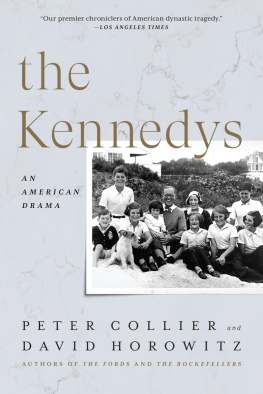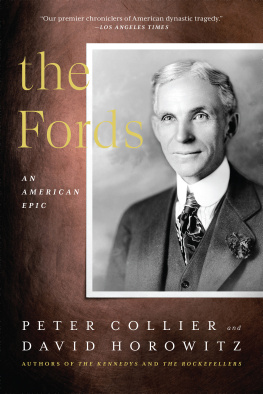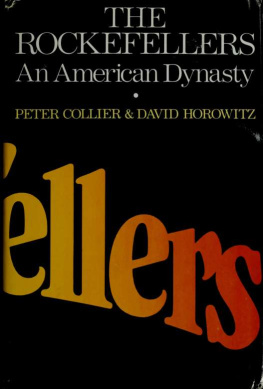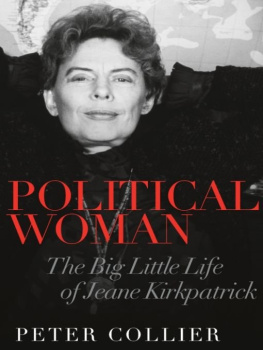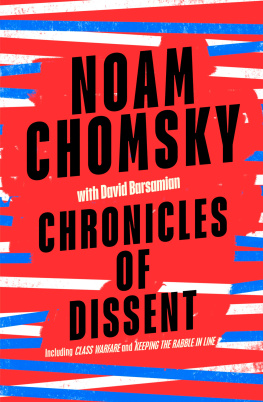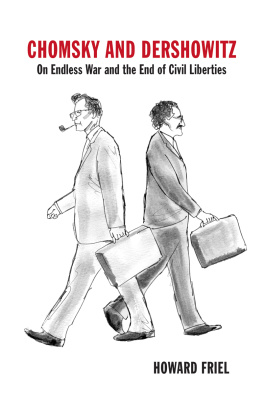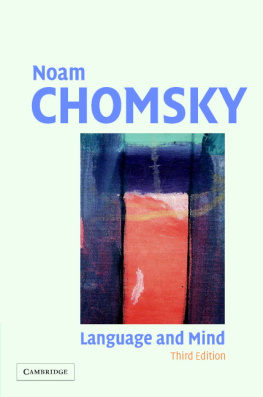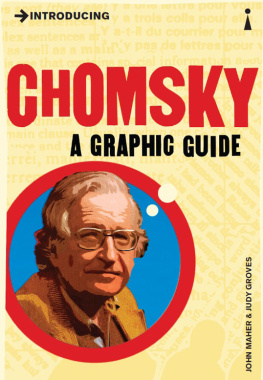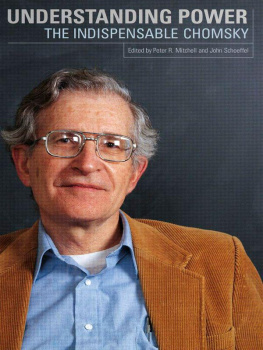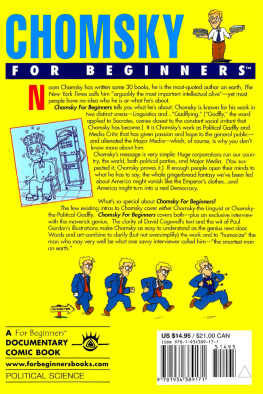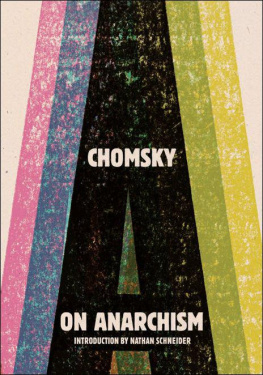ONE
W hitewashing D ictatorship in C ommunist V ietnam and C ambodia
Stephen J. Morris
Since the late 1960s, Noam Chomsky's political writings have been treated with enormous respect in the United States. The sources of Chomsky's prestige are obvious. First, he is the most important theoretical linguist of modern times. Second, in his writing and speaking against American military involvement in indochina, Chomsky seemed to provide a clear and firm basis for opposing U.S. policy in that region. While liberal academics, politicians and journalists spoke of good intentions mistakenly applied, Chomsky presented a less complex, more Manichean view of America and its adversaries. For Chomsky it was perfectly clear that the United States and the regimes it supported in Indochina represented moral iniquity, while the Communists of Vietnam, Laos and Cambodia represented moral justice.
The historical consequences of the Communist victories that Chomskyand the New Left generallyadvocated were quick to manifest themselves in Indochina after Hanoi's victory. The "forces of progress almost immediately launched massive reprisals against the communities they had conquered. in Vietnam this meant the creation of an enormous gulag of prisons, "reeducation camps and "New Economic Zones to deal with the hundreds of thousands of people who had dared to swim against the tides of history. Less than three years later, Hanoi began to implement an "ethnic cleansing through deportation of Vietnam's ethnic Chinese minority. In neighboring Cambodia, after 1975 the Khmer Rouge undertook their historical task with even more vigor. There, "enemies were simply murdered on a massive scale.
As the evidence of Indochinese Communist behavior began to reach the West, there were three possible responses open to those who had supported Communist victories in Indochina. The first was to admit the brutal and murderous nature of the new revolutionary regimes and the error of past political support for them. Such an admission would bring with it an effort to diminish if not eradicate the evil that these people had mistakenly contributed to. This was the path taken by, for instance, most of the democratic Left in France. The second possible response to the evidence was to admit what was going on but try to justify it, usually with some bizarre form of moral relativism (e.g., letting "them solve their own problems in "their own way). Some of America's antiwar liberals, led by George McGovern, took this alternative for the first three years of the Pol Pot regime, and it remained the attitude of many of these people, including McGovern, with regard to Vietnam. The third possible response was to deny the evidence of repression, either totally or in part, and thereby retain one's pride and prejudice. The American radical Left took this course, with Noam Chomsky in the vanguard.
The repressive character of the Communist movements and regimes was well known from the day the Vietnam War began. Indeed, it was central to the entire debate over the war. Thus, it is worth considering first how Chomsky dealt with that issue.
Chomsky and the Vietnam War
The United States government began its military intervention in Southeast Asia, in what was then French Indochina, in the middle of 1950. At that time, less than a year after the final military victory by the Communists in the Chinese civil war and just weeks after the North Korean Communists invaded South Korea, President Truman decided to provide substantial military aid to the French colonialists in their war against the Vietnamese Communists. The stated purpose of the interventionto prevent the spread of Communismwas consistent with the broader policy of containment that had been applied in Western Europe after 1947, when the Soviet Union's takeover of Eastern Europe became manifest. The United States' global policy of containment was to prevent all non-Communist countries from falling into the orbit of the Soviet Union. During the 1960s, after the Soviet Union and China had split over, among other things, the tactical question of support for wars of national liberation in the Third World, U.S. policy was based on a fear of the influence of Maoist China more than that of the Soviet Union. But in any case, the United States publicly opposed the spread of all Communist movements on both national security and moral grounds.
Chomsky rejected that rationale for American military interventions against Communism in the Third World. Never one for an original idea in analyzing the nature of world politics, Chomsky propounded a materialist interpretation of American motives in the Third World: The overriding goal of American policy has been to construct a system of societies that are open to free economic intervention by private enterprise.1 As a corollary, he held a benign view of Communist revolutions in the Third World. In his eyes, these were popular movements attempting to escape a system of global economic domination by the capitalist West in order to chart a course of participatory socialist economic liberation. Thus Chomsky's view of the war in Vietnam was a simple one: the Vietnam war is simply a catastrophic episode, a grim and costly failure in this long-term effort to reduce Eastern Asia and much of the rest of the world to part of the American-dominated economic system.2
What about the arguments that the United States presented as to its own motives, namely that it was trying to prevent the spread of brutal dictatorships modeled on and aligned with those of the Soviet Union or China? For Chomsky, this justification was merely a means to conceal the true motives from the American public so as to ensure political support: The ideology of anticommunism has served as a highly effective technique of popular mobilization in support of American policies of intervention and subversion in the postwar period.3
In the manner of all analysts influenced by Marxism, Chomsky reduced the stated foreign policy motives of the United
States to an ideology, and he confused the social purpose of an ideology with its truthfulness or falsehood. Thus he felt no need to refute it. Accordingly he rejected a priori any view of Communist revolutions in the Third World as attempts by minorities to seize power in order to create totalitarian dictatorships. He also rejected any evidence of deliberate policies of mass murder by these elites in pursuit of their ideological agendas.
Yet for those who are concerned whether or not a government's stated policy is based upon an accurate portrayal of political and social reality, evidence matters. This is especially so when the lives of millions of people are at stake in the outcome of a war. Let us consider what the evidence was and is about who the enemy of the United States was in Vietnam.
The regime that controlled North Vietnam after 1954 was the political creation of the Vietnamese Communist Party, founded in 1930 by Nguyen Ai Quoca full-time employee of the Moscow-based Communist International (Comintern), who later adopted the alias Ho Chi Minh. At the time, the new party consisted of a handful of Vietnamese Communist exiles in Hong Kong. It was originally named the Indochinese Communist Party (ICP) to indicate its ambition to rule over all of the former French colonies in Southeast Asia, which included the ethnically non-Vietnamese and subsequently independent nations of Cambodia and Laos. After World War II, the party went underground, though its leaders controlled an ostensibly nationalist political front organization called the Viet Minh, which attempted to destroy all rival Vietnamese nationalist organizations. Its agenda was to seize total power, first by negotiation with the French, and from late 1946 on, by expelling the French from the region through armed force. The clandestine ICP resurfaced as three separate entities in 1951. The Vietnamese segment was renamed the Vietnam Workers' Party in 1951and in eschewing the word Communist it was paralleling the deceptive nomenclature of the Communist parties in East Germany and North Korea.


